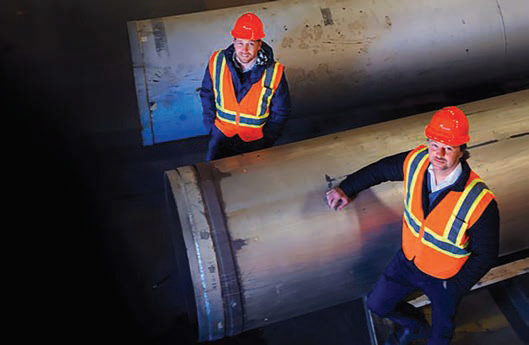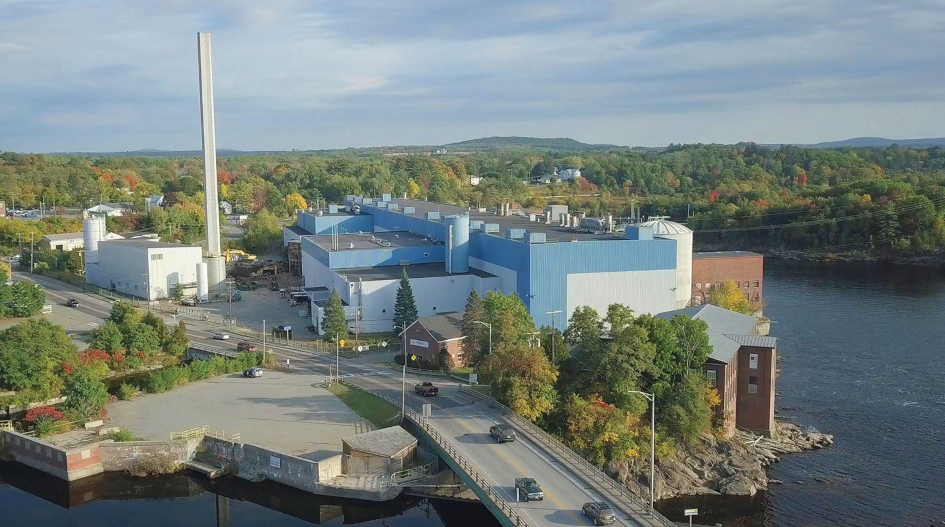Go Lab in Wood Fibre Insulation Board First
16 July 2021Plans to establish the first wood fibre insulation board plant in the US are moving apace, with equipment already transferred to the Maine site from Europe. We look at the plant plans
An industry first is taking shape in the US, with GO Lab’s project to establish the wood fibre insulation board plant in the country.
The main plant equipment for GO Lab Inc’s venture in Maine was recently sourced from Homatherm’s Berga site in Germany – originally installed by Dieffenbacher at the latter in 2009.
More than 80 regular and oversized shipping containers arrived in Maine in February, while a boiler was sourced from a recently closed paper plant in Canada. The Dutch container ship Alamosborg arrived at the Mack Point terminal in Searsport.
GO Lab Inc’s aim is to have its production site in Madison up and running in 2022, making it the first company to produce wood fibre insulation in North America. By contrast, there are more than 15 manufacturing plants in Europe producing the material supporting US$700m in sales across the EU.
Dieffenbacher supported the company in financing the relocation and planning of its re-installation. Dieffenbacher will also modernise the plant and install new equipment, including a gluing system and dryer.
“Our Madison facility is going to have three production lines,” said Dr Joshua Henry, who founded GO Lab together with Matthew O’Malia in 2017.
“The Dieffenbacher line is the largest and most complex, beginning with the refining of the wood chips and continuing all the way to the production and packaging of the final product.
“We’ve received great support from Dieffenbacher throughout the whole process – beginning with de-commissioning the facility in Germany, purchasing, financing and shipping the equipment and planning for the engineering required for the line’s revival in the US.”
Dr Henry holds a PhD in Physical Chemistry and Materials Science and has deep background in advancing renewable energy and energy conservation technologies.
MARKET OPPORTUNITY
GO Lab will be producing boards, batts and loose fill under the brand name TimberHP. It hopes to build on wood fibre insulation’s proven market success in Europe.
“The idea to start production of wood fibre insulation in North America developed over time,” explained Mr O’Malia.
“As an architect, I consistently heard builders complaining about the itchy particles from mineral wool and fibreglass, and the bad air quality. Non-recyclable scraps of foam took up tremendous space in dumpsters, and plastic dust from cutting board insulation covered the ground and installers’ clothes during application.
“Additionally, I began thinking about why we were using insulating products heavily derived from petroleum to reduce the amount of fossil fuel required to operate the buildings. The reduced energy consumption is cancelled out by these mainstream insulations and their high carbon footprints.
“We found that wood fibre insulation would solve all these problems, but since it is such a light-weight product, significant freight costs made importing it from Europe unreasonably expensive,” he said.
“In contrast, we figured that wood fibre insulation made in America – with much lower raw material and energy costs – would enable us to enter the market at a price point similar to other insulation options. We’ll be able to offer a high-performing, sustainable, comprehensive insulation product with a negative carbon footprint priced for mainstream adoption.”
The directors also saw how Maine’s forest products industry could benefit from a high-value composite, like wood fibre insulation, to help diversify the sector and respond to the state’s declining paper industry.
Since 2016, Maine has seen six paper mills, thousands of jobs, and hundreds of millions of dollars of GDP vanish.
With this loss of economic productivity, Maine has also lost an outlet for softwood chips once destined for paper mills, which has made it more difficult to manage forests and balance the needs of the industry.
Maine can reliably produce over 13 million tons of certified sustainable wood each year. The state’s current forest harvest is more than 30% below replacement rate.
PANDEMIC & INVESTMENT
GO Lab made some changes to its financial strategy in the early stages of the Covid-19 pandemic which proved to be beneficial.
The company attracted new domestic investors, hired a chief marketing officer and moved to a financing strategy anchored by US$30m in equity and US$85m in conduit bond financing through the Finance Authority of Maine’s Revenue Obligations Securities Programme.
This had the effect of allowing GO Lab to move to full production faster and it is targeting the start of manufacturing in late 2022.
One of the single largest components to arrive at the factory so far is the boiler, which fulfils an important role. To create the insulation products, wood chips, pressure, and steam are required, with the boiler providing the pressurised steam. It had a very short previous life at a paper mill in Canada that recently closed.
PRE-OWNED EQUIPMENT
“We found good, pre-owned equipment to install in our plant at an extremely reasonable cost – saving capital for other necessary infrastructure needs,” said Joe Clark, who manages mechanical and utilities support for GO Lab and worked for years at the Madison mill as the mechanical maintenance manager for Madison Paper Industries.
The first phase of renovations at the site started last August with an initial two-anda- half months of demolition featuring the removal of the buildings and structures, including the boiler house, turbine room, specialty chemicals building, and several oil storage tanks.
The demolition included the removal of foundations, which were backfilled with structural fill.
All eyes will now be watching the progress of this plant to see whether it could be the start of a new wood fibre insulation board trend in North America.



